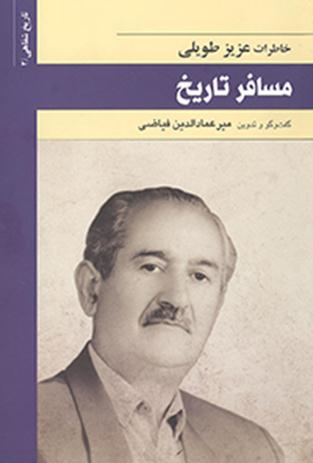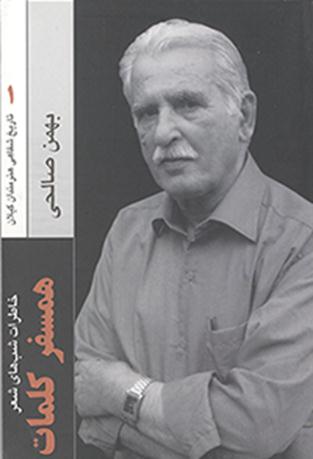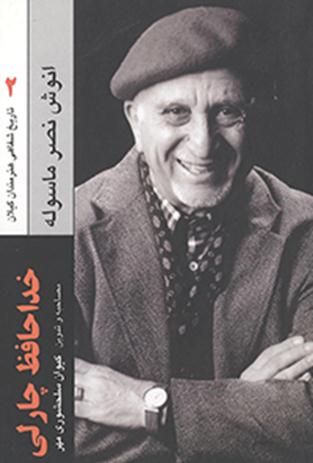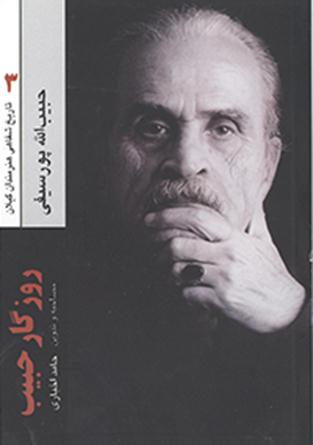History traveler, Words Companion, Goodbye Charlie, Habib Time etc…
Memories for Oral History of Gilan
Art Bureau of Gilan has released since 2015 so far volumes of two book series that "oral history" is their general introducer.
Mohammadali Fatemi
Translated by Ruholallah Golmoradi
2017-1-22
Individuals and Families, Job and Environment
One of the series published two volumes: "Gray Years: memories of Doctor Hushang Montaseri", interviewed and the formulated by Ali Amiri and "History Traveler: memories of Aziz Tavili" interviewed and the formulated by Miremad al-Din Fayyazi W. The two books were released by Ilia Culture Publication that is working in Rasht.
Oral History website's Readers before it have been met eight chapters and 344-page book of "Gray Years" (published in 2015); a work including memories one of officials of Palavi II about realities of some events that have been observed himself.

"History Traveler" (published in 2016) in 392 pages with 35 chapters and appendices of sample of poetry, index and photos, includes memories of Aziz Tavili, a researcher and writer from Gilan. The book begins with notes of Gilan Art Bureau and a note of the editor. It is stated in a paragraph of the note that "oral history is not just description of bittersweet and story of Joy and Sorrow but a hint at sociology, anthropology, ecology, economics, politics, religion ...." we find out also from hint of the editor that "it includes memoirs of the narrator till 1979. So most of the memories are about years before victory of the Islamic Revolution, which was part of the narrator's life in the Imperial Navy. In this respect, memories a personnel of the pillar 2 is regarded that then was transferred to counter-intelligence of Bandar-e Anzali Navy Base, As well as memories of days of Russian Soldats who entered Anzali in excuse of World War II."
According to the narrator it is stated too: "I wrote this biography since far last years, daily during occurrence of accidents or next day so that one day maybe be considered and exploited. But because of improper maintenance of papers and that they were torn due to moisture, I had to re-write it, but I tried not to add or subtract a word."
The structure of the text is formed as most of narrated events have exact date, and this indicates it is auto-biography. Some parts which are not in this way show that provided in an interview with the narrator. Whether that or this, content after offering information about the narrator's person and family, paid attention to his job and environment; a job that is military occupation and an environment that is northern Iran, and influence of social and political events on these. In this perspective, the narrator succeeded to manage his auto-biography in such a way that stimulates audience's curiosity in the same themes that were noted.
Rasht Days
Another series of Gilan Art Bureau that has been released some volumes by Ilia Culture Publication, generally titled "Oral History of Gilan Artists". Published titles include " Words Companion: Memories of Poetry Nights", memories of Bahman Salehi, "Goodbye Charlie: Memories of Anoosh Nasre Masouleh (Nasrallahzadeh)" interviewer and editor Keivan Salahshoori Mehr, "Habib Time: Memories of Habibollah Poorseifyi" interviewed and edited by Hamed Ekhbari.

"Words Companion" (published in 2015) at 201 pages, includes memoir of Bahman Salehi that he himself stated: "It is part of my memories, with mostly humorous view, of numerous poetry nights I has participated in a few years before the Revolution to the present, whether encouraged by friends, or because of sympathy with the revolution, or inner desire to travel and tour in cities of our lovely homeland, Iran, and or because of occupational engagement in the respective department for doing cultural affairs."
In memories of Salehi, days and persons who were prominent in his mind are notable and because the days and persons are well known too out of the atmosphere, so they are absorbing for the audience too. Poetry of 1980s (1360s SH) and 1990s (1370s SH) and poetry congresses of Sacred Defense are also topics that Salehi referred to some memories about them and the memories more late, has greater historical value.
The second book of series "Oral History of Gilan Artists ", "Goodbye Charlie" (published in 2015) includes

333 pages and 7 chapters. Memories of Anoosh Nasre Masouleh (Nasrallhzadeh) enters in environment of theater and cinema and radio in Gilan and Rasht, and includes story of the narrator since 1950s (1330s SH) to the days that he played in TV show "Kuchake Jangali (forestry young)". His observations and narrates is finally also a history of performing arts in Rasht, and impact of historical and political events on them is clear. As chapter VI of the book titled "Revolution Time" and the narrator talks about his mood and surrounding in 1979.

"Habibi Time" (published in 2016) with 203 pages also addresses life and story of Habibollah Poorseifi, a teacher, actor and director from Gilan and has 5 chapters. He remembers days when he and Khosrow Golsorkhi were servants of ceremony of Ahl al-Bayt (AS), had seen tanks that were brought to streets of Rasht due to June 5, 1963, demonstrations in Iran, and has played in TV Shows of "Kuchake Jangali" and the movie "Ey Iran". It also, similar to "Goodbye Charlie", includes names and addresses of Gilan's art history, especially in Rasht city, that in series of "Oral History of Gilan Artists" is complementary of the purpose that Art Bureau of the province follows in publication such books: "What is important in oral history is addressing details and following events step by step and more knowledge of the events that could be considered a help for a correct analysis of history."
Of course, about these two book series that that were listed some of their features and title "oral history" is their general introducer, it seems that the debate has started that to what extent they are oral history or memoir? Because 5 works has been produced and the number is so much that needed to be reviewed and criticized.
Number of Visits: 6996








The latest
- Obstacles, Limitations, and New Horizons
- Third Regiment: Memoirs of an Iraqi Prisoner of War Doctor – 11
- 100 Questions/10
- The 23rd Commemoration Ceremony of the Martyrs of the Ansar al-Rasul Battalion Held
- A Narrative of Pakistani Pedestrian Pilgrims of Arbaeen in Sistan and Baluchestan
- Oral History Methodology/National Archives and Library Organization of Iran, Archives Research Institute
- Third Regiment: Memoirs of an Iraqi Prisoner of War Doctor – 10
- 100 Questions/9
Most visited
- Oral History Methodology/National Archives and Library Organization of Iran, Archives Research Institute
- 100 Questions/9
- Third Regiment: Memoirs of an Iraqi Prisoner of War Doctor – 10
- A Narrative of Pakistani Pedestrian Pilgrims of Arbaeen in Sistan and Baluchestan
- The 23rd Commemoration Ceremony of the Martyrs of the Ansar al-Rasul Battalion Held
- 100 Questions/10
- Third Regiment: Memoirs of an Iraqi Prisoner of War Doctor – 11
- Obstacles, Limitations, and New Horizons
100 Questions/6
We asked several researchers and activists in the field of oral history to express their views on oral history questions. The names of each participant are listed at the beginning of their answers, and the text of all answers will be published on this portal by the end of the week. The goal of this project is to open new doors to an issue and promote scientific discussions in the field of oral history.The Importance of Pre-Publication Critique of Oral History Works
According to the Oral History website, a meeting for critique and review of the book “Oral History: Essence and Method” was held on Monday morning, November 10, 2025, with the attendance of the book’s author, Hamid Qazvini, and the critics Mohammad Qasemipour and Yahya Niazi, at the Ghasr-e Shirin Hall of the National Museum of the Islamic Revolution and Sacred Defense.Challenges of Interviewing in Oral History
After years of studying the theoretical foundations of oral history, conducting numerous interviews and going through their post-interview stages, as well as reading the available body of oral history literature, I was eventually given the opportunity to evaluate the edited versions of dozens of oral history projects.Comparing the Narratives of Commanders and Ordinary Combatants in the Sacred Defense
An Analysis of Functions and ConsequencesThe experience of the Sacred Defense cannot be comprehended merely through statistics or official reports; what truly endures from war are the narratives of those who stood upon its frontlines. These narratives, however, vary significantly depending on one’s position, responsibilities, and lived experience.


